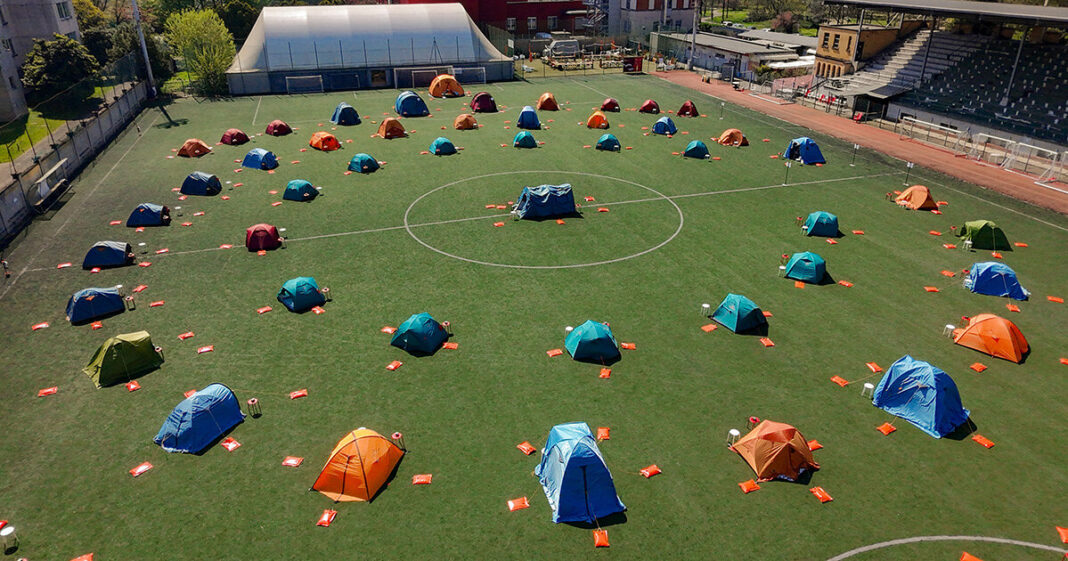IED Milano reveals Glitch Camp for Milan Design Week 2025
During Milan Design Week 2025, Istituto Europeo di Design (IED) opened the second edition of The Glitch Camp, an inclusive urban camping experiment designed for young international creatives. Under the theme Designing Togetherness, the initiative offered a temporary home and cultural platform for 400 ‘glitchers’ — students from 45 nationalities — transforming a Milanese sports centre into a living, breathing, shared campus. This vibrant collective gathering merged design, dialogue, and community, amplifying spontaneous, real-world connections in a global city obsessed with objects. Through installations, workshops, performances, and DJ sets, the Glitch Camp became a manifesto for design as a tool for the common good.
‘With the second edition of The Glitch Camp, IED underlines the importance of the role of Design as a tool that also serves the common good,’ says Riccardo Balbo, Chief Academic Officer IED Group. ‘Our students and faculty from the DesignXCommons courses have developed Design Togetherness, a programme of activities and meditations on the relationship between the individual, society and space. The camp and the new public programme, which is also open to the city, are some of the ideas that IED DesignXCommons and the Francesco Morelli Foundation are putting forward for Milan Design Week.’
IED’s free urban camp accommodated students from all over the world during the Milan Design Week 2025 | all images courtesy of IED
IED’s master of arts students are ‘Designing Togetherness’
IED Milano stands as a creative hub within Milan’s design landscape, nurturing experimentation, research, and socially engaged design culture. Its Master of Arts programmes form the backbone of this philosophy, guided by DesignXCommons — a concept promoting design as a collaborative, civic, and relational tool. Through the activities of The Glitch Camp and its public programme, these courses showcase how design education can shape a future of inclusion, cultural accessibility, and collective well-being.
At the heart of this initiative is Designing Togetherness, a programme conceived by IED’s Master of Arts students to explore the intersections of society, space, and interaction. The project transformed Milan’s Enrico Cappelli Sports Centre into a temporary urban commons, designed by students using second-hand materials and guided by sustainable principles. The programme invited Milan Design Week visitors into shared experiences, meditations, and performances celebrating the power of design to connect people.
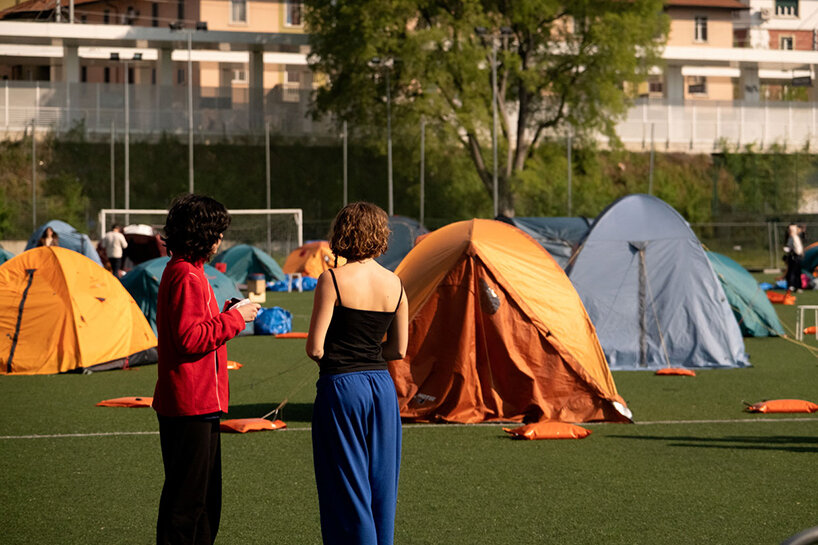
through installations, workshops, performances, and DJ sets, the Glitch Camp became a manifesto for design as a tool for the common good
IED’s Master of Arts students go beyond classrooms
Powered by partnerships with IKEA, Bosch, and Ferrino, The Glitch Camp embodied the values of DesignXCommons — making Milan Design Week a place not just for design objects but for inclusive, socially conscious experiences. Through their work, IED’s Master of Arts students demonstrated how design education can go beyond classrooms, transforming spaces, forging new relationships, and generating dialogue around what it means to live, create, and connect together.
The programme’s focus on sustainability strengthened with the Atelier Upcycling by Ferrino in collaboration with Mental Athletic workshop, where campers creatively repurposed discarded camping tents under the guidance of Ferrino’s pattern-makers. This practical reflection on material reuse merged innovation and environmental responsibility. Meanwhile, Extreme Writing transformed creative writing into a live, competitive spectacle, where student teams battle through literary improvisations on design themes.
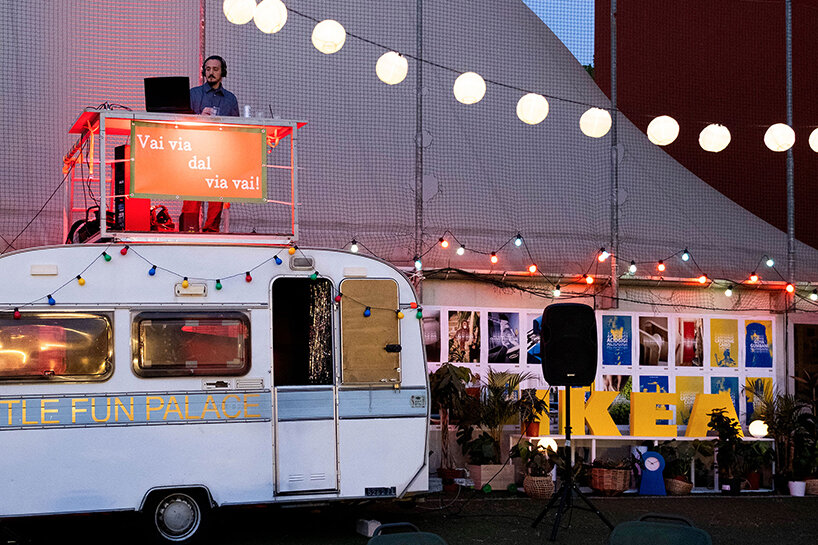
The Glitch Camp offered live performances and entertainment during the late afternoon slots
The Glitch Camp’s atmosphere was shaped by its Master’s students, who created a communal area of repurposed furniture, anchored by a large open-air table — a contemporary symbol of public conviviality. Reminiscent of Italian courtyards where neighbours once gathered, this shared space hosts workshops, performances, and informal gatherings. The students’ daily fanzine, Fregüj, meaning ‘crumbs’ in Milanese dialect, curated event highlights embodying inclusion and cultural dialogue, making design week more accessible and participatory.
A dynamic schedule of activities unfolded across the week, organized by the students. The Upcycling Atelier by Ferrino, in collaboration with Mental Athletics, encouraged the glitchers to reuse the life cycle of the tents by creating new solutions. Additionally, Rito di Panificazione Collettiva (Rite of Collective Breadmaking) turned breadmaking into a metaphor for coexistence and shared culture, led by master baker Davide Longoni and the Scuola del Pane e dei Luoghi collective. Moreover, social designer Gabriel Fontana hosted Beyond Competition: Playing for Connection, an alternative sports workshop where shifting teams challenged notions of identity, belonging, and solidarity through a playful, design-led lens.
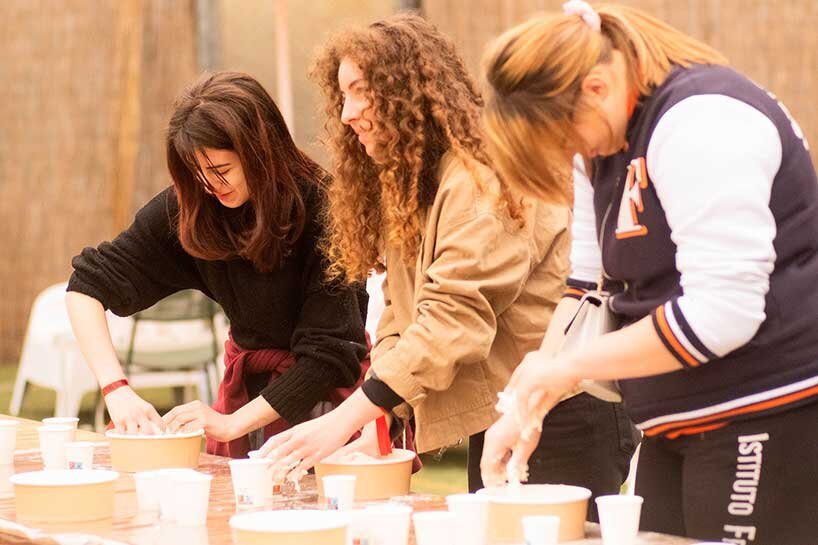
the week also included a breadmaking workshop to open up conversations on food, ecology, and social justice
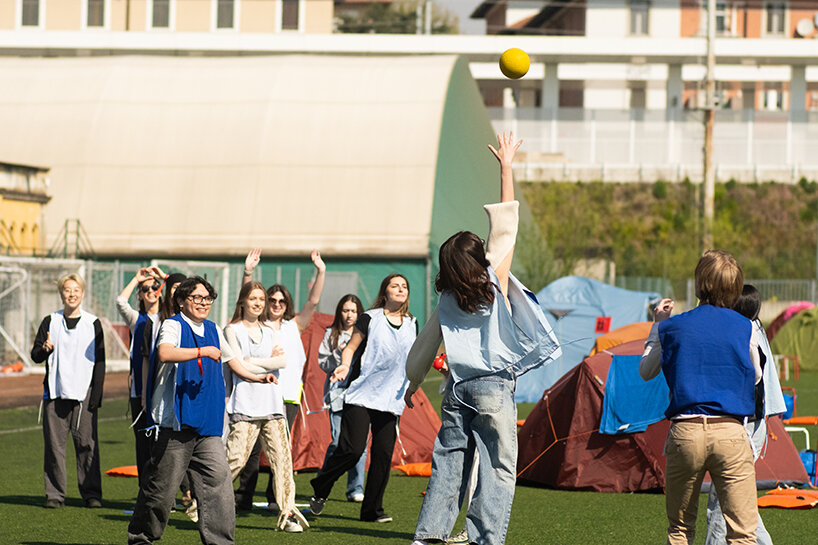
social designer Gabriel Fontana hosted Beyond Competition: Playing for Connection
The Glitch Camp wasn’t only an occasion for the international student community to connect, but also a networking opportunity among the cultural actors of the Fuorisalone. In fact, thanks to the cultural partnership with BASE Milano, The Glitch Camp also welcomed 20 young designers on the terrace of the Cultural Centre in Via Tortona, by Parasite 2.0. The 9-day stay program included workshops, wellness activities, moments of conviviality, and practice exchanges, designed together by the Master of Arts at IED and BASE Milano, with the participation of the Francesco Morelli Foundation.
Additionally, Angela Rui, head of MA programmes, Linda Di Pietro, Artistic Director BASE Milano, and Benedetta Marietti, Cultural Committee at Fondazione Francesco Morelli, curated a day of talks with thinkers including Carlo Alberto Redi, Manuela Monti, Gabriel Fontana, Raumlaborberlin, and Valeria Mosca. These voices addressed new pluralistic design frameworks, reconnecting urban communities with nature, public space, and collective identity.
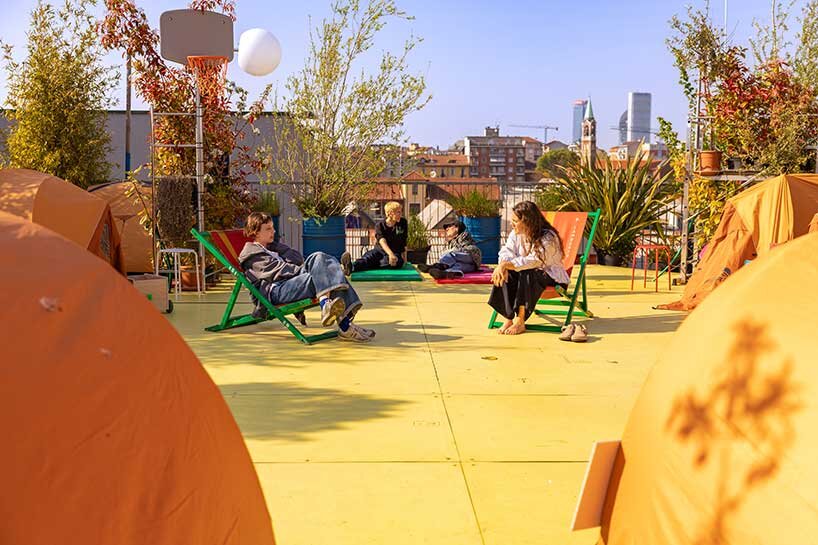
thanks to the cultural partnership with BASE Milano, The Glitch Camp also welcomed 20 young designers on the terrace of the Cultural Centre in Via Tortona, by Parasite 2.0
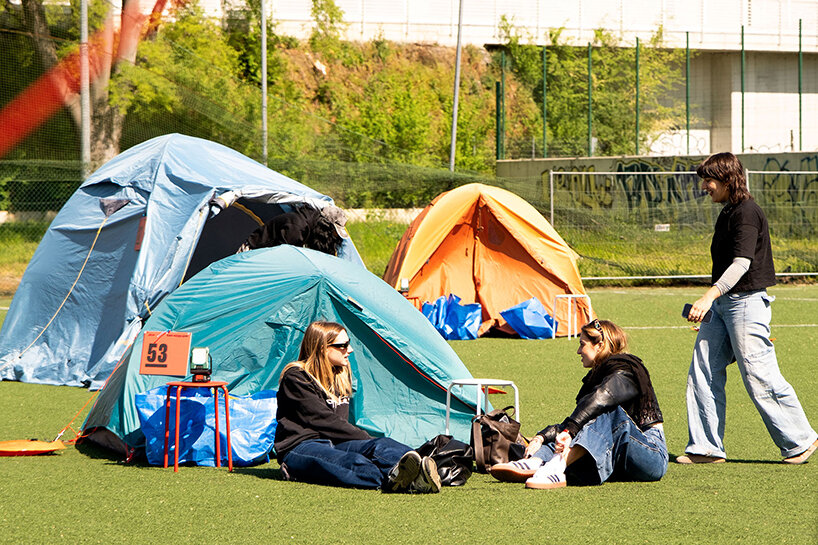
the glitchers used a campsite equipped with Ferrino tents designed specifically for outdoor activities

